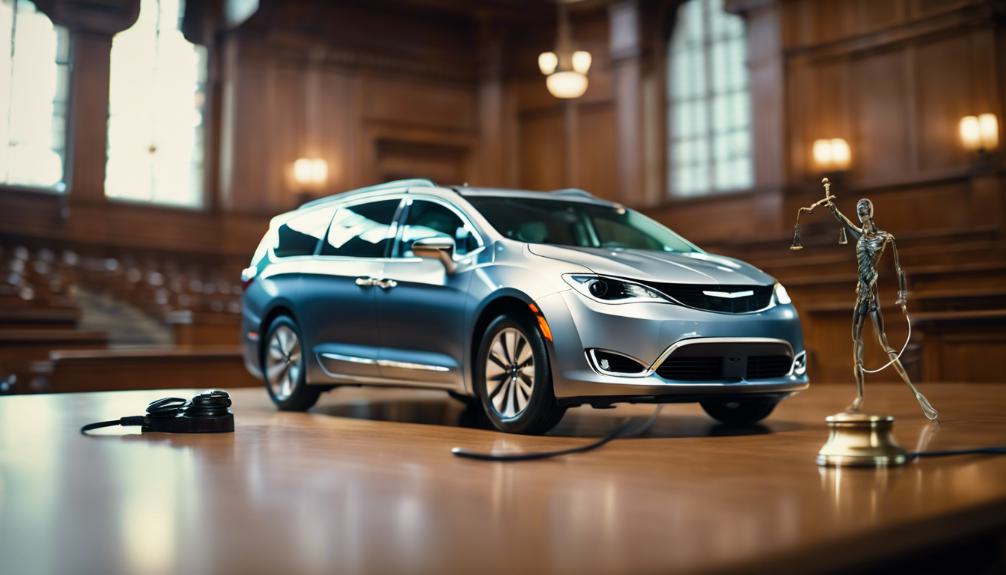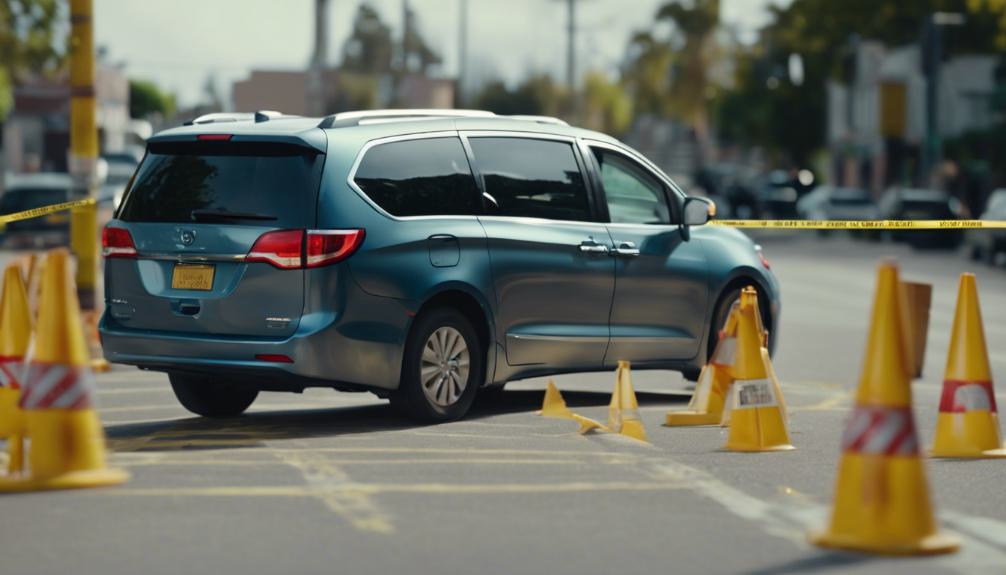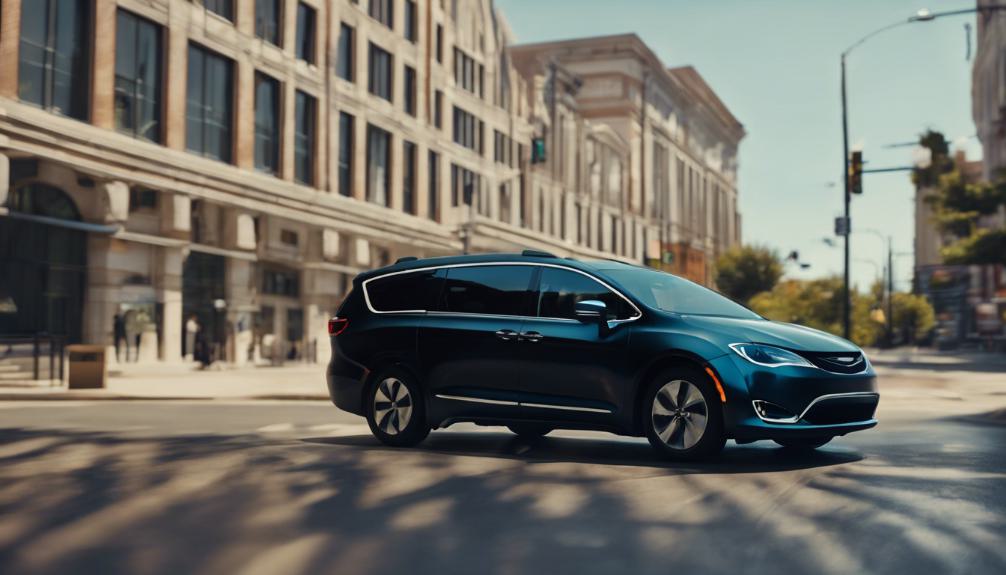Pacifica Hybrid: Lawsuit Exposes Hidden Shutdown Danger
The recent lawsuit against Fiat Chrysler America concerning the Pacifica Hybrid minivan models exposes a potentially hazardous defect, highlighting the broader implications of automotive safety and manufacturer accountability. As allegations surface regarding a propulsion system flaw that could lead to spontaneous vehicle shutdowns, the legal and ethical dimensions of FCA's response—or lack thereof—come into sharp focus. This case not only questions the integrity of FCA's commitment to consumer safety but also prompts a reevaluation of regulatory oversight in the automotive industry. Given the stakes involved, including the safety of thousands of drivers and passengers, one must consider the ramifications of this lawsuit on future industry practices and consumer trust.
Key Takeaways
- The lawsuit claims over 67,000 Pacifica Hybrid minivans (2017-2023) risk spontaneous shutdown due to a propulsion system defect.
- FCA allegedly knew about the shutdown risk since February 2018 but concealed it from consumers.
- The defect is linked to a faulty wiring harness connector, risking transmission failure and power loss.
- FCA's recall plan includes a software update, not a wiring harness replacement, which plaintiffs argue doesn't resolve the underlying issue.
Lawsuit Overview

A class-action lawsuit has been filed against Fiat Chrysler America (FCA), targeting the model years 2017-2023 of the Pacifica Hybrid minivan, over allegations that a propulsion system defect poses a spontaneous shutdown risk, endangering passengers and other road users. The legal action underscores a commitment to public safety and consumer rights, aiming to hold FCA accountable for what plaintiffs argue is a significant oversight in vehicle design and safety protocols. This lawsuit serves as a rallying point for those affected, seeking not only to rectify the immediate threat but also to make sure that corporate responsibility is upheld. By advocating for transparency and corrective action, the lawsuit aims to foster a safer driving environment for all, emphasizing the paramount importance of consumer protection and ethical corporate conduct.
Propulsion System Defect

Building upon the lawsuit overview, it becomes imperative to examine the propulsion system defect at the heart of the allegations against Fiat Chrysler America for the Pacifica Hybrid minivan. This critical flaw, identified in models from 2017 to 2023, poses a significant risk to public safety, with over 67,000 vehicles implicated. The essence of the defect lies within the vehicle's propulsion system, specifically in its ability to unexpectedly shut down during operation due to faulty internal transmission wiring. This issue not only endangers the passengers within the vehicle but also presents a broader hazard to public safety on the roads. The commitment to ensuring the well-being of others demands that this defect be addressed with urgency and transparency, highlighting the importance of immediate corrective action to prevent potential accidents and injuries.
Shutdown Risk Details

The defect in the propulsion system of the Chrysler Pacifica Hybrid minivan, capable of causing immediate and unpredictable shutdowns while driving, poses a substantial safety hazard to occupants and other road users. This malfunction, affecting vehicles across model years 2017 to 2023, underscores a critical safety concern that could lead to accidents, injuries, and property damage. The spontaneous nature of these shutdowns, occurring without warning, deprives drivers of control over their vehicles, greatly increasing the risk of collisions. Given the potential for such incidents to occur on public roads, the importance of addressing this issue promptly cannot be overstated. For those dedicated to ensuring the safety and well-being of others, this situation demands immediate attention to prevent harm to the community at large.
FCA's Information Concealment

In an unsettling revelation, Fiat Chrysler America (FCA) has been found to have concealed critical information regarding a defect in the Pacifica Hybrid minivan's propulsion system that poses a spontaneous shutdown risk. This deliberate omission of crucial safety data not only undermines trust in the automotive giant but also jeopardizes the well-being of countless families and individuals relying on the safety of their vehicles for daily transportation. The failure to disclose such significant risks highlights a neglect of duty towards consumer safety and a disregard for the potential consequences of such a flaw. This action, or lack thereof, by FCA serves as a stark reminder of the paramount importance of transparency and accountability in safeguarding public safety in the automotive industry.
Wiring Harness Flaw

A critical flaw within the Chrysler Pacifica Hybrid's wiring harness has been identified as the culprit behind the vehicle's spontaneous shutdowns, posing significant safety risks to drivers and passengers alike. This defect, rooted in the wiring harness connector utilized in the model's dual-mode driving system, can precipitate a short circuit. This failure leads to a sudden loss of transmission functionality, effectively robbing the vehicle of both gasoline and electric power without warning. The inherent design of the transmission, which heavily relies on electric motors, exacerbates the vulnerability to such failures. Despite the profound implications of this flaw on vehicle safety and reliability, responses have been limited to software updates, leaving the core issue unaddressed and continuing to jeopardize the well-being of those who serve our communities by using these vehicles.
Potential Accident Scenarios

Understanding the flaw in the Chrysler Pacifica Hybrid's wiring harness sets the stage for exploring how this defect leads to potential accident scenarios on the road. When the propulsion system unexpectedly shuts down, drivers find themselves suddenly without power in critical moments—such as traversing through intersections, merging onto highways, or traveling at high speeds. This not only endangers the occupants of the Pacifica Hybrid but also poses significant risks to surrounding vehicles and pedestrians. The unpredictability of these shutdowns increases the likelihood of collisions, as other road users may not have sufficient time to react to the disabled vehicle. Consequently, this defect challenges the safety of public roadways, underscoring the imperative for swift and effective solutions to prevent potential harm to communities.
Recall and Mitigation Efforts

Responding to the identified risks, Fiat Chrysler America initiated a recall in March 2023, aimed at addressing the spontaneous shutdown issue in the Pacifica Hybrid minivans. This recall represents a critical step towards ensuring the safety and reliability of these vehicles, underscoring the company's commitment to rectifying the propulsion system defect that poses a risk to passengers and the public. By proactively reaching out to owners of the affected minivans, Fiat Chrysler America demonstrates its dedication to upholding safety standards and preventing potential accidents. This move also serves as a reassurance to customers, emphasizing the importance of addressing safety concerns promptly and effectively, and highlights the company's responsibility towards the well-being of its customers and the broader community.
Software Update Limitations

Fiat Chrysler America's decision to address the Pacifica Hybrid's propulsion system defect through software updates falls short of tackling the root cause: the faulty wiring harness. This approach, while seemingly proactive, only offers a superficial solution. It merely alerts drivers to potential failures rather than preventing them. For individuals and families who depend on their vehicle for daily transportation, the risk of unexpected shutdowns remains a significant concern. The well-being of passengers and the safety of other road users should be the paramount consideration in any corrective action. Consequently, the reliance on software updates to mitigate a hardware defect does not adequately serve the interests of the public or uphold the responsibility manufacturers have to make sure the reliability and safety of their vehicles.
Legal Implications

While the software update approach by Fiat Chrysler America addresses the immediate notification of potential failures, the underlying hardware defect in the Pacifica Hybrid's propulsion system raises serious legal concerns for the automaker. The lawsuit underscores the potential for substantial financial and reputational damage, highlighting the paramount importance of consumer safety in vehicle design and manufacturing. This legal action could compel FCA to undertake more rigorous testing and quality control measures, ensuring that future vehicles are free from such perilous defects. It serves as a reminder to the automotive industry of its duty to safeguard the well-being of its customers, urging a shift towards more transparent and proactive safety protocols. This case may set a precedent, emphasizing the necessity of prioritizing consumer safety over cost-saving measures in vehicle design and production.
Frequently Asked Questions
How Can Pacifica Hybrid Owners Determine if Their Vehicle Is Specifically Affected by the Recall?**
Pacifica Hybrid minivan owners concerned about their vehicle's inclusion in the recall should first verify their minivan's model year, as the defect pertains to models spanning 2017 to 2023. Subsequently, they should contact an authorized dealer or Fiat Chrysler America (FCA) directly for confirmation. Additionally, vehicle identification numbers (VINs) can be checked against the National Highway Traffic Safety Administration's (NHTSA) recall database online for specific recall notices affecting their vehicle.
This Question Explores the Practical Steps Owners Can Take to Identify if Their Own Minivan Is Included in the Recall, Beyond the General Model Years Mentioned.
To navigate the turbulent waters of uncertainty, Pacifica Hybrid minivan owners must go on a diligent quest for clarity regarding their vehicle's recall status. This journey begins by consulting the official Fiat Chrysler America (FCA) website, where VIN-specific information can be found. Additionally, direct communication with authorized dealers can provide a beacon of guidance, ensuring that individuals can confirm whether their minivan sails within the recalled fleet, thereby safeguarding their commitment to safety and service.
What Are the Long-Term Implications for the Resale Value of Pacifica Hybrid Minivans Affected by This Defect?**
The lawsuit against Fiat Chrysler America regarding the Pacifica Hybrid minivan defect could have significant long-term implications for the resale value of affected models. Potential buyers may be wary of purchasing a vehicle known for a propulsion system defect that leads to spontaneous shutdowns, impacting its market appeal. This could result in depreciated resale values, making it challenging for current owners to sell their vehicles without incurring financial losses.
Owners Might Be Concerned About How This Issue and the Lawsuit Might Impact the Future Market Value of Their Vehicles.
Owners of the affected Pacifica Hybrid minivans are understandably apprehensive regarding the potential impact of the propulsion system defect and the ongoing lawsuit on their vehicle's future market value. This concern is valid, given that consumer confidence in a vehicle's reliability and safety profoundly influences its resale value. The extent of the defect, combined with public awareness and legal proceedings, could potentially depreciate the vehicles' resale value over time.
Are There Any Similar Historical Precedents With Other FCA Vehicles Experiencing Similar Propulsion System Issues?**
Historically, Fiat Chrysler Automobiles (FCA) has encountered similar propulsion system issues with other vehicles, reflecting a pattern of challenges within their product lineup. These precedents underscore the importance of rigorous quality control and transparent communication with consumers to preemptively address potential safety hazards. Ensuring the integrity of propulsion systems across all models is vital to safeguarding passengers and maintaining trust in the automotive industry's commitment to safety and reliability.
Conclusion
In the unfolding narrative of Fiat Chrysler America's legal quandary, the Pacifica Hybrid serves as a potent emblem of the perilous journey between innovation and oversight. This saga illuminates the shadowy path companies may tread when transparency is forsaken for temporal gains. As the curtain falls on this chapter, it heralds a pivotal moment for industry accountability, urging a collective stride towards the beacon of consumer safety and trust. The recall and ensuing legal discourse signify a critical recalibration of corporate compasses, guiding them back to the paramountcy of integrity and responsibility.

This post has been generated by AI and was not reviewed by editors. This is Not legal advice. Please consult with an attorney.
